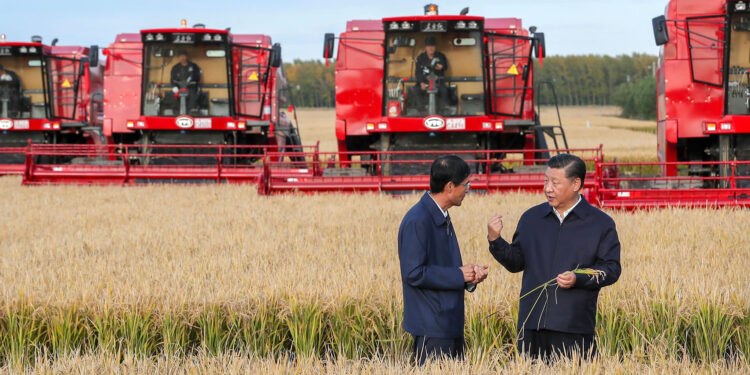“My dream is to put Pakistani soybeans on the Chinese table.” Mohammad Ali Raza, head of technology promotion at Pakistan’s National Strip Compound Planting Research Center, said in an interview with this reporter a few days ago. In Raza’s hometown of Bahawalpur, Punjab Province, Pakistan, the experimental demonstration fields used China’s corn-soybean belt compound planting technology.
In 2018, Yang Wenyu, Raza’s mentor when he was studying at Sichuan Agricultural University, participated in the SCO agricultural technology exchange and international seminars and training courses. In the communication with the participating Pakistani agricultural experts and officials, Yang Wenyu saw the promotion of compound planting technology in Pakistan. prospect. According to the report of the Ministry of Agriculture of Pakistan, Pakistan has a strong demand for soybeans but faces difficulties such as limited soybean planting technology, low yield, and heavy dependence on imports of soybeans. China’s corn-soybean strip compound planting technology can not only increase soybean yield, but also improve the utilization rate of light and water, and improve the lodging resistance of corn.
“This is a really good technology, and it will be successfully promoted in Pakistan.” Raza warmly invited Yang Wenyu to his hometown for experiments. “Technological progress will greatly change the face of rural areas and improve people’s lives,” Raza said during his studies in China, he saw many such cases and always looked forward to bringing China’s advanced agricultural technology back to his hometown.
In the first 3 years, although this planting technology performed well in the experimental demonstration fields in Pakistan, the promotion effect was not satisfactory. To this end, Laza ran around and introduced to the villagers in the field: “Is it good or not, please come to our demonstration field to have a look.” It is estimated that the adoption of new technology can increase the crop income per hectare by 30% to 50%.”
Raza’s efforts were not in vain. In 2020, through a series of promotion activities organized by the SCO Agricultural Technology Exchange and Training Demonstration Base in Shaanxi, China, more and more Pakistani people have learned about the effectiveness of this planting technology. In 2021, the number of experimental and demonstration fields owned by Raza will increase from 4 to 15, with a planting area of 40 hectares. With the establishment of the Pakistan National Strip Compound Planting Research Center, 5 scientific research institutions, 5 farms, and 1 enterprise have successively joined the market promotion of this technology. Today, the 12 pilot sites in the irrigated agricultural area using the corn-soybean strip compound planting technology have achieved good harvests, with the average yield per unit area of corn and soybean reaching 8,490 kilograms and 889 kilograms per hectare, respectively.
Through the corn-soybean belt compound planting technology, Pakistan uses fewer resources and labor to invest in soybean planting, eases the pressure on soybean imports, improves the agricultural structure, and promotes local farmers to reduce poverty and increase income, becoming a member of the SCO for agricultural technology exchanges and cooperation. The model of development also inspires more Pakistani youth like Raza to participate.
In June this year, the SCO Agricultural Technology Exchange and Training Demonstration Base held a promotion conference on the cloud. Jin Tianle, a Pakistani student studying for a doctoral degree at Northwest A&F University, introduced the demonstration base’s advantages in facilities agriculture, water-saving irrigation, and cultivation of new crop varieties. Research results. He looks forward to bringing these technologies back to Pakistan to increase agricultural production and income in his hometown. “The training provided by the demonstration bases gives us more opportunities to apply the knowledge we have learned and bring opportunities for agricultural development in our hometown.” Jin Tianle said. (Reporter Cheng Shijie )

